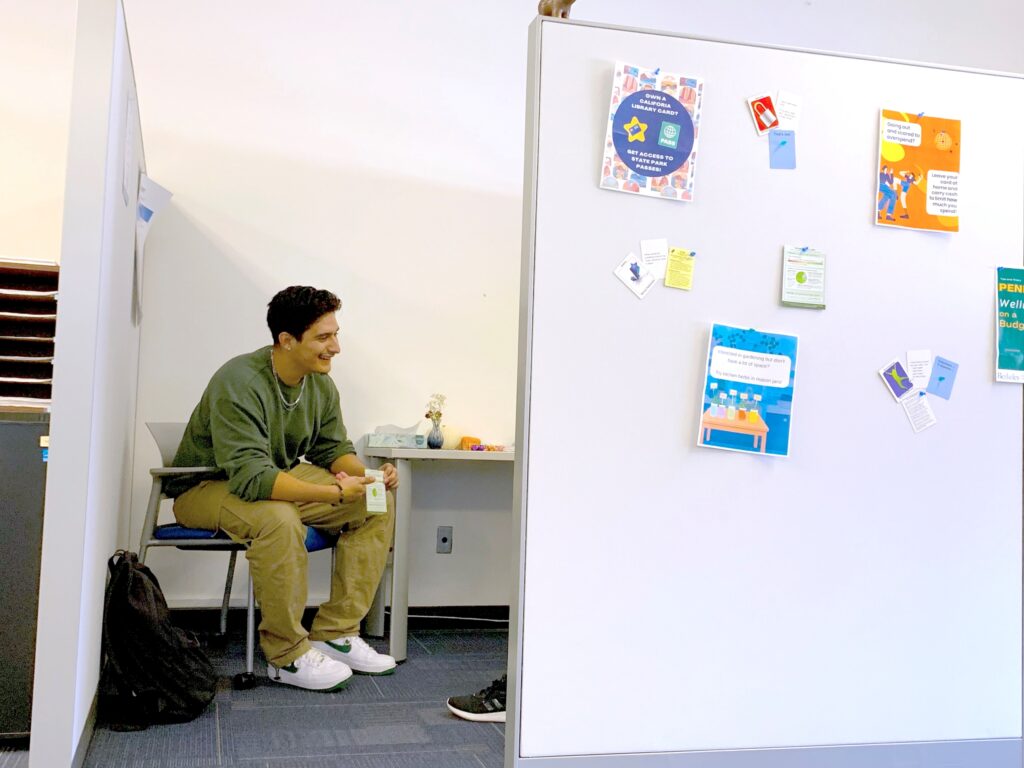
Financial Guidance for Berkeley Students
Newly independent and don’t know where to begin in terms of managing your finances? Interested in planning ahead financially? For all UC Berkeley undergraduate and graduate students, there’s a resource on campus that can make this a lot easier and help you feel more confident about your finances. The Center for Financial Wellness is your one-stop shop for financial management tools. Their peer coaches are trained to help you create a spending plan, access financial resources, and talk through practical steps to increase your financial knowledge and security.
In order to experience what they have to offer, I signed up for a financial coaching consultation and came away with a clear plan to create my budget and personal criteria for the best bank for me. Financial coach and second-year Cal student Rafael Villasenor answers some common questions about the center and their services.

Rafael Villasenor, he/him, second-year Pre-Haas and Econ major, Financial Wellness Coach
Booking Your Appointment
Booking a financial wellness appointment is incredibly straightforward as it is all done online. You have the option for thirty-minute and hour-long appointments both in person and virtual. It’s up to you but Rafael has some advice.
Rafael: “Thirty minute [sessions] are more for Q&A type things or something quick or creating a spending plan because we can do that pretty fast. The one-hour appointments are for more informational or harder cases. Most of our students do one-hour sessions because even if it’s something simple it can go longer. They have that leeway, and the appointments can always end early.”
I went to their Book Your Appointment page, selected the virtual hour-long appointment to be safe on time, chose Rafael Villasenor’s name, picked an available date and time, submitted some personal details, and gave some details as to what I wanted to cover. I had the appointment conveniently before my first class that day in the morning. I chose the virtual option, but if you’d like to meet in person, their office is in Sproul 210. In-person may be more restricted in availability, so check their drop-in hours schedule posted on their website (schedule varies by semester).
Preparing for the Appointment
Extensive preparation is not necessary for these appointments.
Rafael: “There’s not much that they need to prepare besides basic information like how much money they have in their savings or how much debt they have if that’s something they want to talk about. But if they just want to learn about finances, they don’t have to come with anything prepared.”
In actuality, very little financial information needs to be shared to gain from the center’s resources, as Rafael affirms.
Rafael: “Students don’t need to reveal anything. We’re not here for recommendation but for education. If they have their reservations about information they don’t want to divulge, the best we can do is educate them on the possible options they have, and that way they can go off and do their own thing. Usually when students are more open, we’re allowed to see their situation in a more personalized way which offers better education on certain topics.”
If students do decide to divulge specifics, it may lead to a more specialized plan of action. Coming prepared with a general outline of what your situation is may be more helpful during the session. However, their education on certain topics and laying out possible options will allow you to gain just as much. The FERPA (Family Educational Rights and Privacy Act) protects the privacy of your student records and prevents any staff member from sharing them without your permission.

Rafael in a coaching session
Who Are You Meeting With?
Financial Wellness Coaches are a group of student peers who have been thoroughly prepared for your financial questions.
Rafael: “[Financial Wellness Coaches] go through intensive training throughout the semester so by the time you’re taking appointments with them, they are really prepared.”
The Financial Wellness Coaches are here to guide you through creating and acting on a more stable spending plan that removes some of the obscurity over common financial topics.
Interested in becoming a Financial Wellness Coach? Here’s what you need to know.
Rafael: “There’s no designated criteria to get in but we are really selective when it comes to choosing our applicants. This past hiring session we had two-hundred-something applicants and we only brought on four… [The center] doesn’t go off of past financial experiences but more of how the person interacts in the interview. This is after narrowing down after reviewing their resume. In the interview process they go down to who is best fit for the position personality-wise.”
Common Topics Covered
Rafael revealed to me a range of services that the Center for Financial Wellness offers.
Rafael: “Our biggest topic is creating a spending plan, so just managing money. Our second biggest is savings and banking, like how to yield savings accounts and the difference between checking and banking accounts. We just started up investing guidance and there are a lot of students interested in that.”
Spending plans, checking and savings understanding, and interest in investing are a few subject matters that the center can provide information and guidance on. But what’s the most commonly asked question they receive during their sessions?
Rafael: “A lot of students want to know which bank to use. Which one is the best for me, but that question is very unique because everyone has a different situation and every bank is completely different in both the accounts they offer and what the company itself offers. Which bank is right for credit cards, which bank is right for savings… it’s usually ‘which bank?’”
Don’t hesitate to contact the Center for Financial Wellness to determine this for yourself. Out of all the common topics and frequently asked questions, what is Rafael’s number one piece of advice he thinks all students should know?
Rafael: “Create a spending plan—that is the number one tip, because everything we go over can be found in a spending plan. If you don’t know how much money is coming in or out, you can’t really do anything else.”

Center for Financial Wellness pamphlets and office space
Meet with the Center Today
When I went into my own appointment, I was struck by the professionalism and assuredness of my financial coach. This team is constantly being educated about the financial world and is a wealth of information. I felt very at ease during my conversation, and am planning to meet with them to set my post-grad budget and discuss potentially switching banks.
If you wish to cover any of these topics for your own personal financial goals, or other topics not mentioned here, schedule an appointment or go to drop-in hours. Before heading into your appointment, you can also fill out this Google form to request a specific financial literacy presentation which covers spending plans, banking, and many more.
How to Connect
Want more ways to connect?
- Follow on Facebook or Instagram
- Attend a financial wellness workshop for essential skills and tools
- Sign up for their monthly newsletter for upcoming events and resources
- Try iGrad and CashCourse, the personal finance tools
- Read the student-run financial wellness blog
- For quick questions that don’t require an appointment, email financialwellness@berkeley.edu
Becoming more financially educated early on will provide a multitude of benefits down the line. If money management is feeling stressful or confusing, reach out to the Center for Financial Wellness, book an appointment with a coach, and be on your way to feeling more confident about your finances.
Preslee Vanlandingham is a senior at UC Berkeley majoring in English and Creative Writing. Photos by Center for Financial Wellness. Feature image shows Rafael in front of the Center for Financial Wellness’ office at Sproul 210 and tabling at Calapalooza.
Want More?
-
- Learn more about career counseling
- Check out work-study benefits
- Explore scholarship opportunities